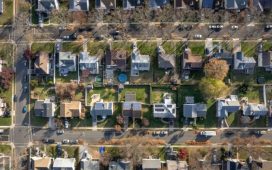Credit agencies have mis-rated more than $100bn of commercial real estate debt in an increasingly popular segment of the market, say mortgage veterans, including at least a dozen deals that maintain top investment-grade ratings even though the borrowers are in default.
The questionable ratings are cropping up in a portion of the mortgage bond market that has evolved in the past decade or so, in which deals are backed by one loan or mortgage on a single major office building rather than on a bundle of multiple properties.
Single-loan deals now make about 40 per cent of the nearly $700bn in outstanding commercial mortgage bonds. Developers like them because they can get better terms than simply borrowing from a bank. Investors like the deals because they tend to have floating interest charges, which has insulated them from the high-rate environment of recent years.
One of those deals is 1407 Broadway, a 48-storey tower in New York City’s garment district, that is facing foreclosure. The owner, San Francisco-based Shorenstein Properties, has not made a payment since July on the mortgage for the building, which is no longer generating enough rent to cover its expenses and interest payments.
Nonetheless, $187mn in bonds tied to the building’s debt are still put at AA by Fitch — a rating the agency says is reserved for borrowers with “very high credit quality” and debts with a “low risk” of default.
For most highly rated mortgage bonds, a single loan default might not impact its rating or an investor’s ability to be repaid. But the $350mn bond deal for 1407 Broadway, more than half of which was rated AAA, is backed by the fortunes of 1407 Broadway alone.
Deals such as 1407 Broadway are causing people like Rod Dubitsky, a former Moody’s and Credit Suisse credit analyst, to make comparisons with the problems that led up to the financial crisis, in which rating agencies like Moody’s and S&P handed out AAA ratings to bonds that were almost entirely backed by subprime borrowers.

“It is probably and easily the worst example of mis-rating of major securities that is out there today,” says Dubitsky, who publishes articles on social media as The People’s Economist. “The integrity of the ratings process has improved very little [since the financial crisis].”
Observers say rating agencies are loath to admit they have mis-rated a AAA deal and are therefore reluctant to lower the rating.
Fitch, through a spokesperson, said the agency did downgrade the 1407 Broadway bond, from AAA, and had put it on watch for further downgrades. As to the quality of its single-loan deal ratings, the Fitch spokesperson said the firm could not comment on industry-wide data and that approaches differed between rating agencies.
Moody’s and S&P, which also issue ratings on single-asset bonds but did not rate 1407 Broadway, declined to comment for this article.
AAA ratings are supposed to indicate that the risk of a borrower defaulting is extremely low. Of companies in the S&P 500, just two are rated AAA, software giant Microsoft and drugmaker Johnson & Johnson.
“You should never have a loss on a AAA-rated bond,” says Ethan Penner, an investment banker who helped create the first commercial mortgage bond in the early 1990s. “The three letters ‘AAA’ next to a bond imply that the world could end and you will not have any losses.”
Nonetheless, a number of AAA-rated deals are looking increasingly risky. Dubitsky has created a list of bond deals, which he calls the “Dirty Dozen”, that were either initially rated AAA or still are, even though the borrower is either delinquent or in default. Ark Capital Advisors, for instance, fell behind on its mortgage on San Francisco office tower 600 California Street in March 2023 and now owes more than $9.5mn in back payments. The bonds, which were originally rated AAA, now trade for 74 cents on the dollar, according to Bloomberg.
In addition to 1407 Broadway, Shorenstein is also behind on its mortgage on 1818 Market Street, a tower in downtown Philadelphia with 1mn sq feet of office space. Shorenstein first missed its loan payment in August, and is now more than $3mn behind. This month, the mortgage servicer moved to declare Shorenstein in default, after the borrower asked to modify the loan. Yet, 1818 Market Street’s $75mn single-loan bond sold to investors in 2021 is still rated AAA by both S&P and Morningstar DBRS.
Critics have warned that the ratings on commercial mortgage bonds backed by a single loan, because they lack diversification, are not as trustworthy as other bond ratings. Marc Joffe, who worked for Moody’s rating mortgage debt in the mid-2000s and who is now a policy analyst at the Cato Institute, wrote about his concerns regarding single-asset deals in 2015 in relation to risks associated with older shopping malls, which were being used to back these deals then.
The Federal Reserve in mid-2020 refused to accept single-loan CMBS bonds as collateral for short-term loans in a Covid-era emergency lending facility.
Scrutiny of these deals increased recently after investors lost 26 per cent of their initial investment in a bond originally rated AAA and backed by a single building — the former Manhattan headquarters of insurance firm MONY, at 1740 Broadway. The building was bought by Blackstone for $605mn in 2014 but was recently sold in foreclosure for just $186mn.
“I think the rating agencies have to take the responsibility, like we did with residential mortgage securities and the financial crisis,” said Joffe. “We have an asset class that has been proven to be defective and yet we still have more deals going out there and getting AAA ratings that they don’t deserve.”










